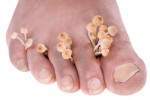Stay Informed
Popular Articles
- Hiatal Hernia: Hidden Cause of Chronic Illness
- Small Intestinal Bacterial Overgrowth (SIBO)
- Applied Lymphology: Unlocking the Secret to Pain Relief
- An Introduction to Constitutional Iridology
- The Low Down on Liver Detoxification
- An Energetic and Emotional Approach to Cancer
- Fat Facts
- Marrow in the Bones
- Blood Type and Nutrition
- Cardiac Herbs: Beyond Hawthorn
Quick Search
The School of Modern Herbal Medicine




Common Misconceptions About Yeast Infections
- 5/31/2013
- Categorized in: Specific Health Problems

Over the years I’ve heard all kinds of strange ideas about yeast infections and their treatment. It has always struck me as very strange that people believe that to get yeast infections under control, you have to avoid all fungi, including mushrooms. It’s like all fungi get lumped into a single category and labeled “bad.” I remember thinking this when a company I have been involved with for many years was removing brewer’s yeast from some of its products because some people were concerned about it aggravating candida. At the time I thought this was “nuts” and still do.
I personally think brewer’s yeast is a better B-vitamin supplement than the synthesized B vitamins that are used in most pills. That’s because it’s a natural food complex, not isolated chemical compounds. The body does better long term with whole foods than it does with isolates.
Here’s why I don’t think brewer’s yeast contributes to yeast infections. One of the most common yeasts used for brewing and bread-making is Saccharomyces cerevisiae. Claiming that eating foods containing S. cerevisiae is going to contribute to infections with Candida albicans is like saying that taking probiotics like L. acidophilus is going to contribute to E. coli or H. pylori infections. It just doesn’t add up.
To back up this idea further, S. boulardii (a different species in the same genus as S. cerevisiae) has actually been used as a probiotic supplement. Studies show it helps reduce symptoms of acute diarrhea in children, travelers, antibiotic users and IBS patients. So, clearly, yeasts, like bacteria can be both harmful and useful.
I also don’t understand why all fermented foods and vinegar are supposed to be eliminated on a diet to reduce yeast overgrowth, but for some people it seems to help. The mother in raw apple cider vinegar is a bacteria colony, not a yeast colony. Kombucha, as I understand, is a fungal colony.
Anyway, if you check “vinegar and yeast online” you’ll find that there are lots of claims that you can cure yeast infections with white or apple cider vinegar. The claims that vinegar is bad come from the idea that yeast prefer an acid environment and that vinegar is an acid-forming food. My understanding is that naturally fermented foods, like raw apple cider vinegar, actually stimulate digestion, which helps to regulate intestinal flora.
The skin and the colon are both naturally slightly acidic. The blood is slightly alkaline. Harsh alkaline soaps make you more prone to skin infections by washing off the acidic environment. Remember that yoghurt is slightly tart (acidic) due to the fact that lactobacteria produce lactic acid, which inhibits yeast and harmful bacteria. Caprylic acid, a fatty acid from coconut oil, also inhibits yeast.
So, not all acids are going to create an environment for yeast over growth. Om fact. acetic acid from vinegar may actually be antifungal. However, most vinegar products today aren’t naturally fermented. Anyway, while many people feel these foods should be avoided with yeast infections, I find it hard to find any solid evidence that naturally-fermented foods (such as raw apple cider vinegar) should be avoided with candida.
I find it especially odd that people think that you can’t eat any mushrooms if you have candida. After all, certain mushrooms, like ganoderma or reshi, shitake, maitake, cordyceps and others, actually stimulate the immune system and help the body combat bacterial, viral and fungal (yeast) infections.
The Yeast Itself Isn’t the Problem
When it comes right down to it, the candida organisms themselves are not the real problem in yeast infections. In other words, if you have yeast infections, it isn’t because you got infected with Candida albicans. Everybody has C. albicans in their body because it’s a normal part of your body’s friendly flora. That’s one reason why many medical people have been slow to accept the idea that yeast overgrowth in the intestines is actually a problem. Everybody has some yeast, so how could it be harmful?
So, let’s make that absolutely clear again. Yeast and fungal infections aren’t caused by eating foods containing yeast or fungi, because yeast are always present as part of your friendly flora. What makes the yeast a problem is when the biological terrain of the body gets altered to allow for yeast overgrowth. In other words, when the body becomes weakened and out of balance in certain ways, the yeast multiply out of control and become a problem.
AIDS patients and other people with compromised immune systems get severe yeast infections because their immune system gets knocked down. So, keeping your pH balanced and your immune system functioning properly is the real key to keeping yeast under control.
